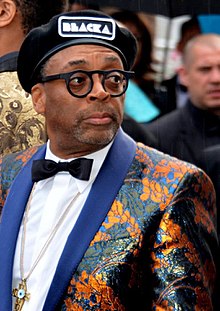Spike Lee
American filmmaker (born 1957)
Shelton Jackson "Spike" Lee (born March 20, 1957) is an American film director, producer, writer, and actor. His production company, 40 Acres & A Mule Filmworks, has produced over 35 films since 1983. Lee's movies have examined race relations, the role of media in contemporary life, urban crime and poverty, and other political issues. Lee has won numerous awards, including an Emmy Award. He has also received two Academy Award nominations.


Quotes
edit- In life, there are times to be quiet, and there are times to shut the fuck up. This is one of those times.
- School Daze (1988), character of Grady.
- Let me tell you the story of right hand-left hand. It's a tale of good and evil. Hate: it was with this hand that Cain iced his brother. Love: these five fingers, they go straight to the soul of man. The right hand: the hand of love. The story of life is this: static. One hand is always fighting the other hand, and the left hand is kicking much ass. I mean, it looks like the right hand—Love—is finished. But hold on, stop the presses; the right hand is coming back. Yeah, he got the left hand on the ropes now, that's right. Ooh, it's a devastating right and Hate is hurt. He's down. Left-Hand Hate KO-ed by Love.
- Do the Right Thing (1989), character of Radio Raheem.
- I may have been born yesterday, but I stayed up all night.
- Mo' Better Blues (1990), character of Bleek Gilliam.
- Everybody's a teacher. People can teach you two things, what to do and what not to do.
- Mo' Better Blues (1990), character of Clarke Bentancourt.
- You always avoid direct eye contact, you know that? Are you afraid of something? Are you afraid that I might see the real you? Huh? Answer me. Come on, answer me.
- Mo' Better Blues (1990), character of Indigo Downes.
- I know that it's painful at times, but we're not making this up. The depths of degradation in cartoons, movies, and television shows, the misrepresentation of a people - it's an American legacy. Not just in television or movies, but in all media.
- Interview with Rebecca Cantu, "About Face: An Interview with Spike Lee", The Crimson, October 20, 2000.
- My film is supposed to reflect that; it is an indictment of the people who write and accept those shows, because we know that they exist today. It also has to do with the $1 million question: What is black? It is a never-ending quest for who we are, and some people are still in search of that.
- Interview with Rebecca Cantu, "About Face: An Interview with Spike Lee", The Crimson, October 20, 2000.
- You know, I grew up around black people my whole life. I mean, if the truth be told, I probably know niggas better than you. And don't go getting offended by my use of the quote-unquote N-word. I have a black wife and two biracial kids, so I feel I have a right. I don't give a God damn what that prick Spike Lee says. Tarantino was right. Nigger is just a word. If Ol' Dirty Bastard can use it every other word, why can't I?
- Bamboozled (2000), character of Dunwitty.
- Here's the thing. I grew up in Fort Greene. I grew up here in New York. It's changed. And why does it take an influx of white New Yorkers in the south Bronx, in Harlem, in Bed-Stuy, in Crown Heights for the facilities to get better?
- Reported in Andy Soltis, "Spike Lee rants on hipsters, gentrification", New York Post (February 26, 2014).
About
edit- With Bamboozled, Lee takes a look at one of film and television's rarest breeds-the black television executive. His satire is based on the current lack of diversity in Hollywood, where 75 percent of television writers are white. And in most cases, the minority writers at networks are all working on the same show (in 1999, it was found that ABC employed nine black writers-all assigned to the same sitcom). In order to succeed in his position as a black television executive, then, Lee's main character delves back into the history of blacks on screen to revive one of the most popular forms of early entertainment: the Minstrel. And with the Minstrel, of course, comes Blackface-perhaps the most dreaded image in the history of American media.
- Rebecca Cantu, "About Face: An Interview with Spike Lee", The Crimson, October 20, 2000.